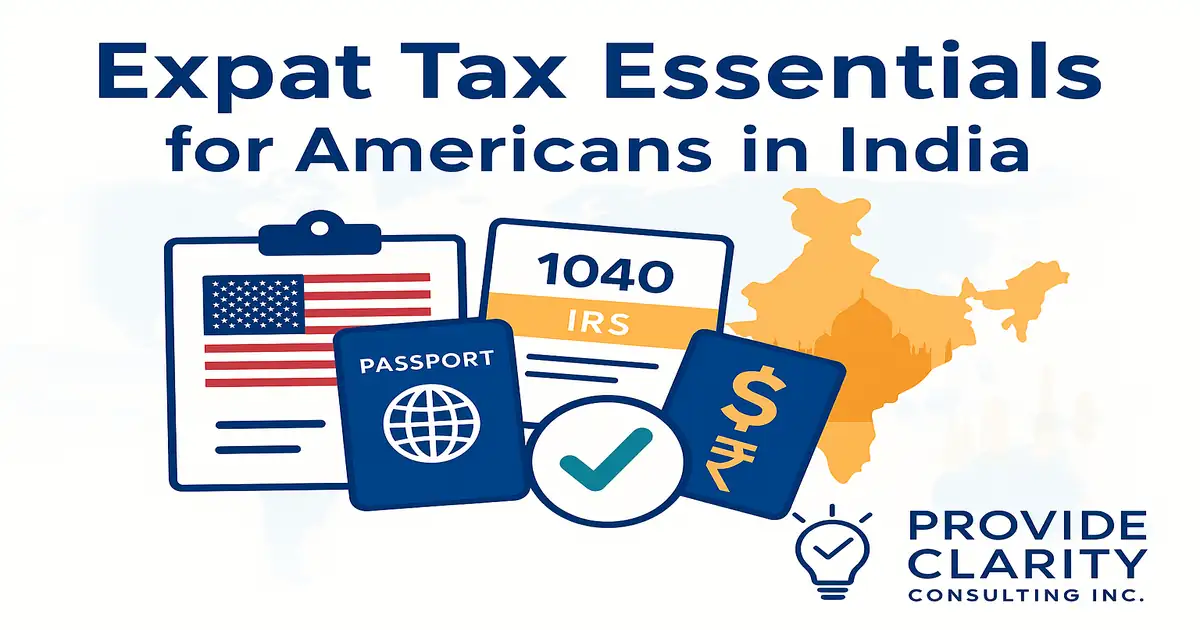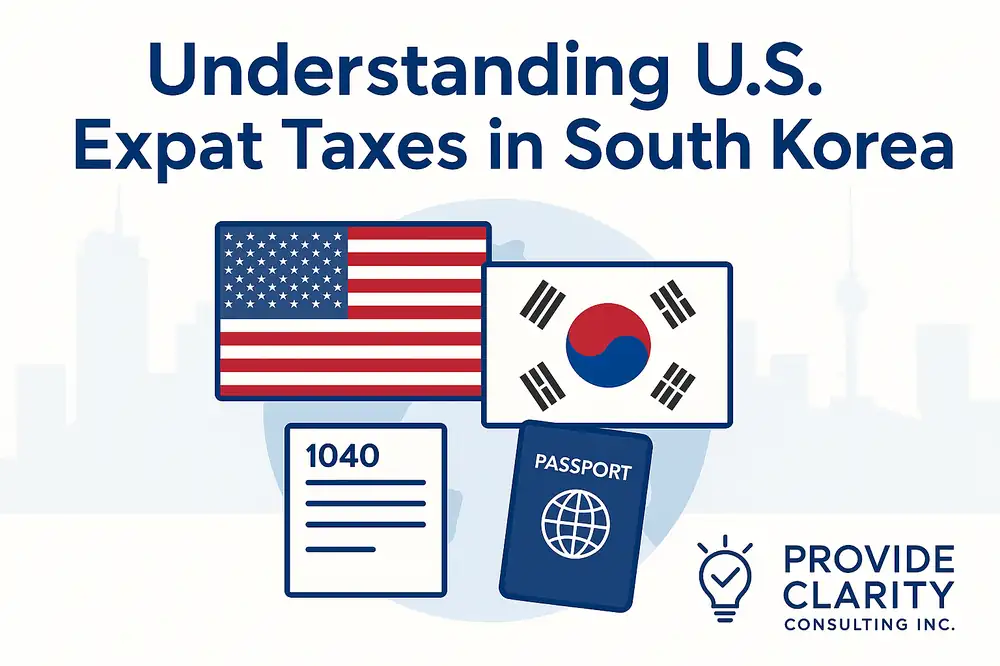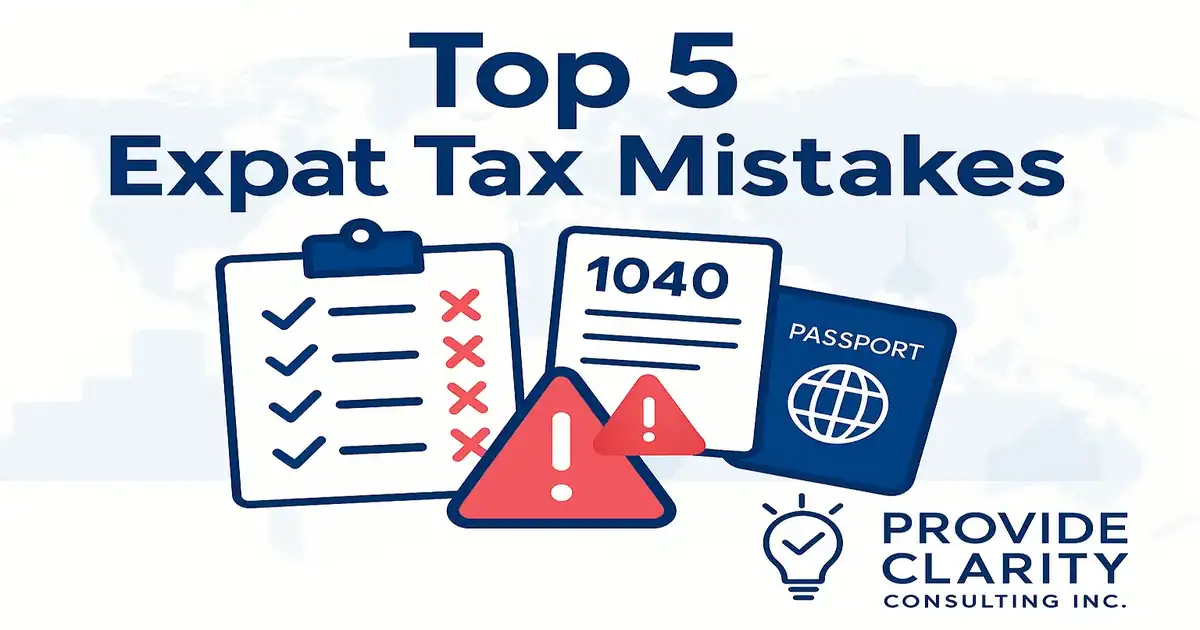Understanding U.S. Expat Taxes in India. What Every American Living Abroad Needs to Know
Estimated reading time: 10 minutes
Key Takeaways:
- The U.S. adopts citizenship-based taxation requiring expats to file taxes on worldwide income.
- American expats in India can leverage treaties and foreign tax credits to minimize taxation.
- Correct and timely filing of forms like Form 1040, FBAR, and FATCA is crucial to avoid penalties.
- Understanding both U.S. and Indian tax systems is essential to ensure compliance and minimize tax liabilities.
Table of Contents
- Introduction: The Complexity of U.S. Expat Taxes in India
- U.S. Tax Obligations for Expats in India
- Indian Tax Obligations for U.S. Expats
- Strategic Considerations for U.S. Expats in India
- Practical Scenarios: Frequently Asked Questions
- Actionable Takeaways: What Should U.S. Expats in India Do Next?
- How Our Firm Can Help
- Resources and Helpful Links
Introduction: The Complexity of U.S. Expat Taxes in India
Each year, the number of American expatriates in India grows, thanks to the country’s booming tech, finance, and startup scenes. Whether you’re an individual employee, a digital nomad, or a small business owner, you remain beholden to U.S. tax laws wherever you go. This framework, known as citizenship-based taxation, means that U.S. citizens and green card holders are taxed not only on American income but on their worldwide earnings, including income earned in India.
Yet, these obligations don’t exist in a vacuum. Indian tax authorities have their own rules for expats and residents. The interplay can lead to double taxation, complex filing deadlines, and costly reporting pitfalls. The good news? With proper knowledge and proactive steps, Americans in India can leverage treaties and credits to minimize their tax burden and stay compliant.
U.S. Tax Obligations for Expats in India
1. Citizenship-Based Taxation: U.S. Taxes on Worldwide Income
Unlike most countries that use residence-based taxation, the U.S. requires all its citizens and green card holders—even those who have lived abroad for decades—to file an annual federal income tax return on Form 1040. This applies to all income earned worldwide, including your salary or profits from India, overseas investment income, and rental property earnings.
Key Practical Takeaway: If you hold a U.S. passport or green card, you must file a federal income tax return every year, regardless of where you live.
2. Expat Filing Requirements—Key IRS Forms
Beyond the standard Form 1040, U.S. expats often need to file additional informational forms. Here’s what typically applies if you live and/or work in India:
- Form 2555 - Foreign Earned Income Exclusion (FEIE): Allows exclusion of up to $126,500 (for tax year 2024; this figure is indexed annually) of earned income if you meet either the Physical Presence Test (330 days out of 12 months outside the U.S.) or Bona Fide Residence Test (a full calendar year residency in a foreign country).
- Form 1116 - Foreign Tax Credit: Offsets U.S. taxes owed by providing a dollar-for-dollar credit for taxes paid to India on the same income, especially beneficial for unearned (e.g., investment) income.
- FBAR (FinCEN Form 114): If you have an aggregate balance of $10,000 or more in foreign (Indian) bank accounts at any time during the year, you are required to file this online form with the Financial Crimes Enforcement Network.
- FATCA Reporting (Form 8938): Mandatory if your specified foreign financial assets exceed $200,000 at year’s end (for single filers living abroad; thresholds differ by filing status).
Actionable Advice: Start tracking your foreign bank balances and assets from day one in India, and maintain accurate records to simplify annual filings.
3. Tax Exclusions and Credits—Mitigating Double Taxation
Foreign Earned Income Exclusion (FEIE)
This powerful provision allows you to exclude a chunk of your employment income earned abroad from U.S. taxation. To claim it, you must pass one of the two residency tests:
- Physical Presence Test: Be outside the U.S. for at least 330 full days in any 12-month period.
- Bona Fide Residence Test: Reside in India for a full tax year and demonstrate a genuine intention to stay.
Foreign Tax Credit
If your Indian income exceeds the FEIE cap or includes unearned income, you can credit income taxes paid in India against your U.S. tax liability, reducing or potentially eliminating double taxation.
4. Filing Extensions and Deadlines
- Automatic Extension: U.S. expats get an automatic two-month extension to file (deadline: June 15).
- Interest Accrual: Any tax owed starts accumulating interest after April 15, even if you qualify for the extension.
- Additional Extension: Can be requested until October 15—especially useful if you’re awaiting Indian tax documents or need more time to complete forms. [Source]
Practical Tip: Mark your calendar with the correct deadlines, and consult a CPA or expat tax professional ahead of time—filing incorrect or late forms can result in steep IRS penalties.
Indian Tax Obligations for U.S. Expats
1. Understanding Indian Tax Residency Rules
India’s definition of tax residency is based on the number of days present in a financial year. Generally:
- Resident: 182 days or more in India in the tax year, or cumulatively 365 days over the past four years plus 60 days in the current year.
- Non-resident: Falls short of the above criteria.
Resident expatriates are taxed on worldwide income; non-residents pay tax only on Indian-sourced income.
2. Indian Filing Requirements
If you are an Indian tax resident, you must:
- File an Annual Income Tax Return by July 31 each year. [Source]
- Declare both Indian and foreign-source income.
- Ensure accurate reporting—failure to disclose foreign assets or income can result in severe penalties under India’s Black Money Act.
GST for Small Business Owners: If you run a business or work as an independent contractor in India, you may also be subject to the Goods and Services Tax (GST), which applies to certain goods and services sold or provided within India.
3. Double Taxation Avoidance Agreement (DTAA)
The U.S. and India signed a Double Taxation Avoidance Agreement (DTAA) to prevent the same income from being taxed twice. The DTAA offers:
- Tax credit mechanisms—U.S. expats can generally claim credits for taxes paid in India when filing their U.S. return.
- Exemptions for certain types of income (e.g., retirement income, student scholarships).
- Lower withholding tax rates on dividends, royalties, and interest under the treaty ([Full DTAA Text]).
Takeaway: Understanding and applying DTAA provisions is crucial to optimizing your tax position and avoiding overpayment.
Strategic Considerations for U.S. Expats in India
1. Tax Planning: The Key to Optimizing Expat Life
U.S.-India tax coordination is complicated, with overlapping deadlines, differing fiscal years (India's is April–March; the U.S. uses the calendar year), and multiple reporting standards. Strategic planning—which includes estimating income, planning foreign account balances, and reviewing treaty benefits—can save you thousands and keep you compliant.
2. The Role of Professional Services
Given the complexity of dual tax compliance, the IRS’s tough stance on offshore non-compliance, and the Indian government’s black money regulations, consulting a cross-border tax expert is no longer optional for most expats. An expat-focused CPA can:
- Help select the optimal approach (FEIE vs. Foreign Tax Credit)
- Consolidate U.S. and Indian tax prep, ensuring no income is omitted or double-taxed
- Review U.S. and Indian tax returns for treaty optimization and risk mitigation
Our firm’s expertise in both U.S. and Indian tax systems uniquely equips us to serve expatriates and small business owners, assisting in everything from initial returns to complex tax audits and voluntary disclosures.
3. Monitoring Ever-Changing Tax Laws
Both the IRS and India’s tax authorities are constantly updating regulations to respond to global trends and crack down on tax evasion. For example, India’s recent increased enforcement of foreign asset reporting and the IRS’s push for stricter FBAR and FATCA compliance amplify the risk for uninformed expats.
Proactive monitoring and regular tax checkups ensure you stay ahead of legislative shifts rather than react to them.
Practical Scenarios: Frequently Asked Questions
Q: I only spent a full year in India and traveling—do I pay US taxes on my foreign income?
A: You still must report worldwide income to the U.S.
Q: Can I really exclude over $126,500 of my foreign salary from U.S. tax?
A: Yes, if you qualify under FEIE rules via the Bona Fide Residence or Physical Presence Test. Any additional foreign income can be credited via the Foreign Tax Credit provisions.
Q: What happens if I forget to file FBAR or my FATCA forms?
A: Non-compliance with FBAR or FATCA can trigger severe penalties (up to $10,000 per unfiled year and, for willful violations, even criminal charges). Don’t risk it, track your account balances and file on time.
Q: My small business in India is registered for GST—does this change U.S. filings?
A: While GST compliance is separate from U.S. tax filings, any profits earned must be factored into your U.S. tax return. Retain all GST filings and coordinate with your tax professional.
Actionable Takeaways: What Should U.S. Expats in India Do Next?
- Start Early: Organize your tax documents ahead of both Indian (July 31) and U.S. (June 15/October 15) filing deadlines.
- Track All Accounts: Record balances of all Indian and global bank, investment, and business accounts for FBAR and FATCA purposes.
- Consult Tax Professionals: Invest in an expert with dual U.S.-India tax experience to avoid paying unnecessary taxes, leverage treaty benefits, and ensure compliance.
- Utilize Exclusions/Credits: Maximize the Foreign Earned Income Exclusion and Foreign Tax Credit every year.
- Stay Informed: Subscribe to updates on U.S. and Indian tax law changes and seek annual tax checkups to adjust your strategy.
How We Can Help
At Provide Clarity Consulting, Inc., we specialize in supporting individuals and small businesses navigating cross-border tax issues between the U.S. and India. From annual income tax preparation and business tax services to FBAR/FATCA compliance and strategic consulting, our seasoned team ensures you stay compliant, minimize double taxation, and make tax-smart decisions while living or working abroad.
Ready to take the stress out of U.S. expat taxes in India? Contact us today for a personalized consultation, or explore our full range of expat and small business tax services.
Resources and Helpful Links
- IRS—Foreign Earned Income Exclusion (Form 2555)
- IRS—Foreign Tax Credit (Form 1116)
- FinCEN—FBAR Information
- IRS—Extension To File
- India Income Tax Department
- IRS—U.S.-India Tax Treaty Documents
Stay ahead of the curve: Bookmark this blog for ongoing updates about U.S. and Indian tax developments. If you’re an American in India and need tailored, professional help, our team is just a click away—reach out today to ensure your cross-border tax strategy is rock-solid and hassle-free.




